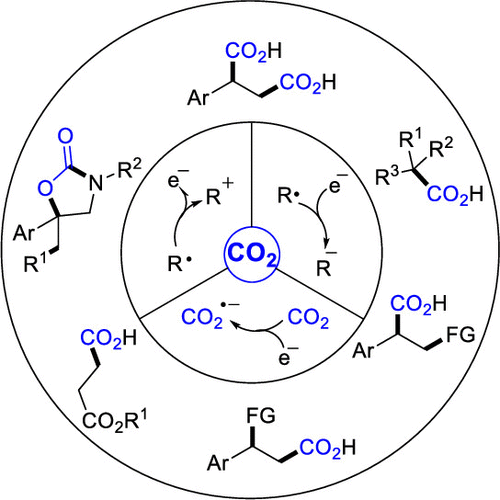当前位置:
X-MOL 学术
›
Acc. Chem. Res.
›
论文详情
Our official English website, www.x-mol.net, welcomes your
feedback! (Note: you will need to create a separate account there.)
Radical Carboxylative Cyclizations and Carboxylations with CO2
Accounts of Chemical Research ( IF 16.4 ) Pub Date : 2021-05-06 , DOI: 10.1021/acs.accounts.1c00135
Jian-Heng Ye 1 , Tao Ju 1 , He Huang 1 , Li-Li Liao 1 , Da-Gang Yu 1
Accounts of Chemical Research ( IF 16.4 ) Pub Date : 2021-05-06 , DOI: 10.1021/acs.accounts.1c00135
Jian-Heng Ye 1 , Tao Ju 1 , He Huang 1 , Li-Li Liao 1 , Da-Gang Yu 1
Affiliation

|
Carbon dioxide (CO2) is not only a greenhouse gas and a common waste product but also an inexpensive, readily available, and renewable carbon resource. It is an important one-carbon (C1) building block in organic synthesis for the construction of valuable compounds. However, its utilization is challenging owing to its thermodynamic stability and kinetic inertness. Although significant progress has been achieved, many limitations remain in this field with regard to the substrate scope, reaction system, and activation strategies.
中文翻译:

自由基羧化环化和CO 2的羧化
二氧化碳(CO 2)不仅是温室气体和普通废物,而且还是廉价,易于获得的可再生碳资源。它是有机合成中重要的一碳(C1)构建基块,可用于构建有价值的化合物。然而,由于其热力学稳定性和动力学惰性,其利用具有挑战性。尽管已经取得了重大进展,但是在该领域中,在底物范围,反应系统和活化策略方面仍然存在许多局限性。
更新日期:2021-05-18
中文翻译:

自由基羧化环化和CO 2的羧化
二氧化碳(CO 2)不仅是温室气体和普通废物,而且还是廉价,易于获得的可再生碳资源。它是有机合成中重要的一碳(C1)构建基块,可用于构建有价值的化合物。然而,由于其热力学稳定性和动力学惰性,其利用具有挑战性。尽管已经取得了重大进展,但是在该领域中,在底物范围,反应系统和活化策略方面仍然存在许多局限性。







































 京公网安备 11010802027423号
京公网安备 11010802027423号